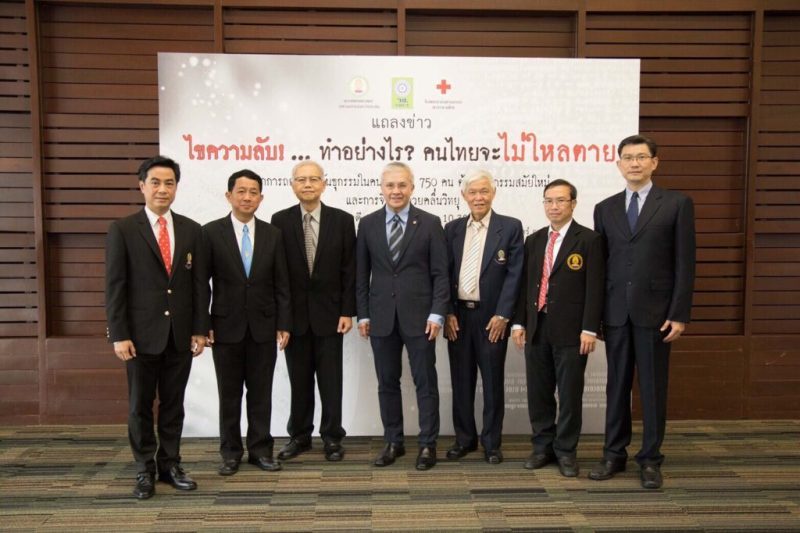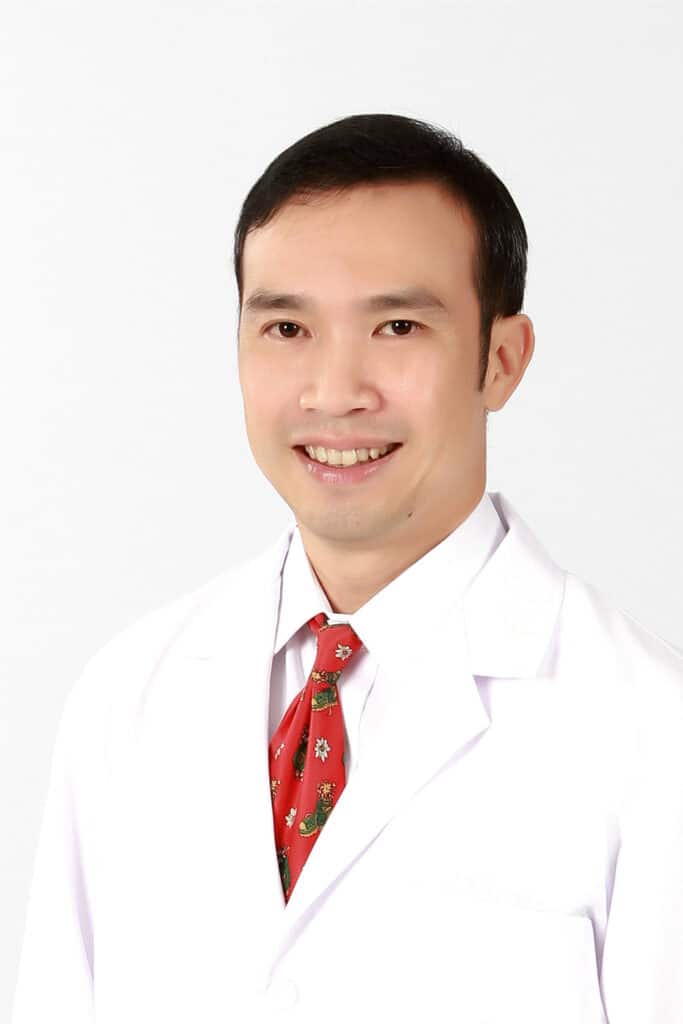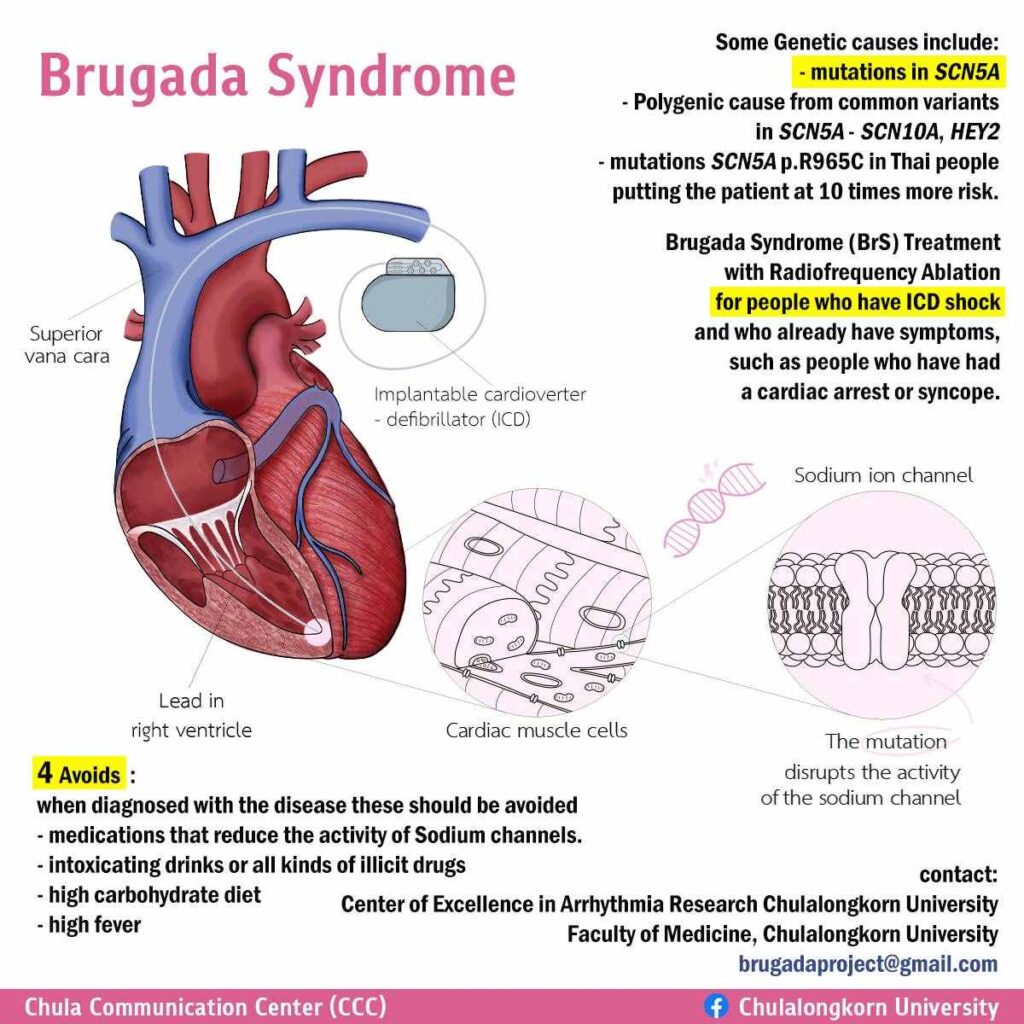While many people try to get a healthy deep sleep, sleep could be a silent threat that leads to premature death. Numbers of Thais who have Brugada syndrome or passed away while asleep have made local and international news. This includes Southeast Asians, particularly the Hmong ethnic group who migrated to the US and passed away while asleep, Thai construction workers who passed away while working in Singapore, and the premature death of a famous teenage male actor.
"Brugada Syndrome is most common in the male population of Southeast Asia. In Thailand, the most common cases are found in the Northeast and the North among fit and healthy young men who would sleep and talk in their sleep before passing away," said Professor Apichai Khongphatthanayothin, M.D., Faculty of Medicine, Chulalongkorn University, on the importance of Brugada syndrome research. Brugada syndrome, an abnormality in heart rhythm, is one of the major causes of Brugada syndrome. There is currently ongoing research on Brugada syndromein the Thai population by the Thai Brugada Syndrome (BrS) Research Group. The research is led by Chulalongkorn University in collaboration with 15 other institutions in Thailand.
Professor Apichai Khongphatthanayothin
What is Brugada syndrome?
Brugada syndrome is often used to describe people who pass away during sleep and are called Sudden Unexplained Nocturnal Death Syndrome (SUNDS) in Western countries. Brugada syndrome also has different names in different parts of the world, such as "Lai Tai" in Thailand, "Pokkuri Death Syndrome" (PDS) in Japan, or "Bangungut" in the Philippines
Patients with Brugada syndrome can express different symptoms with some being asymptomatic making individuals unaware of having the disease. The current diagnostic guideline includes the use of an Electrocardiogram (ECG) to identify the presence of marker(s) for cardiac arrhythmia, which was demonstrated to increase the risk of the syndrome. The development of severe cardiac arrhythmia could potentially lead to death.
"Brugada symptoms often manifest at night. Symptoms include Agonal breathing, which occurs when patients gasping for air after severe cardiac arrhythmias due to the absence of blood supply to the brain. Patients could experience restlessness or tenseness in their sleep like they are about to faint. While the next day patients could feel hazy when they wake up or some may faint, mostly when they are not performing any heavy activities. The worst-case scenario is passing away in their sleep."
Why do so many Thais have this disease?
SUNDS is common among Asians, especially Southeast Asians. The incidence rate in Thailand and Southeast Asia is estimated to be 1 in 1,000, which is higher than the incidence rate of 1 in 2,000 found in other countries.
"We still don't know the exact cause of such high incident rate in Thais, but "genetics" has been thought to play an important role in the disease prevalence. Our team is trying to figure out which genetic factors cause such high incidence found in Thailand when compared to other regions of the world or why this disease is more prevalent in Southeast Asians than other races."
Even in Thailand, SUNDS is more common in the North and the Northeast regions and is not often found in the South.
"Some people in the Northeast have low potassium levels. Would this play a part in inducing the condition of SUNDS death? Or is it diet? Because in the North and Northeast, people tend to eat foods that are higher in carbohydrates than in other regions, can this also be the cause? This is still being researched."
The main cause of Brugada syndrome
At present, it can be concluded that Brugada syndrome can be caused by either genetics or environmental factors.
- Genetic factors
Prof. Dr. Apichai explained that rare genetic mutations in a gene called "SCN5A" were reported in 20% of the patients in Western countries. SCN5A gene encodes for the voltage-gated sodium channels found in the heart muscle cell. Mutation can cause severe cardiac arrhythmias and can lead to death. Research done in Thais found that only 7-8% of patients have such a mutation.
"There is also evidence of at least three genetic variations, commonly found within the Thai population, involved in the development of SUNDS. These genetic variations are called single nucleotide polymorphisms, frequently referred to as SNPs (pronounced "snips"). Each of them can increase the likelihood of developing the disease by 2-2.5 times. The likelihood of developing the disease increases with the number of mutations carried. This is called polygenic inheritance". However, studies in Thai also found that there are mutations in the middle group between common variants (SNPs) and rare variants. SCN5A gene mutation, "R965C", can be found in 1 in 200 healthy Thai individuals but R965C mutation increases the chance of developing the disease 10 times more than those without the mutation.
- Environmental factors
Brugada syndrome patients may not show any symptoms until some factor/s triggers cardiac arrhythmias, which can lead to death.
"Brugada syndrome patients have a chance of developing arrhythmia during high fever, which means the chance of death also increases," Prof. Dr. Apichai said.
Other risk factors for arrhythmia include male sex as men are more likely to develop the disease than women (while reasons are under research), or excessive consumption of carbohydrates like rice, flour, sugar, and alcohol.
"Warning" signs of Brugada syndrome
While Thai men are at risk of having this syndrome, it is not practical to screen all Thai men as ECG must be performed on an individual basis. Prof. Dr. Apichai recommends that only those with "warning" signs should consult the doctor for an ECG test. These "warning" signs include:
1. A family history of SUNDS, or relatives who passed away while asleep without known cause.
"The examination of patients' family history indicates that several patients have relatives who passed away from Brugada syndrome ", Prof. Dr. Apichai said.
If there is a family history or relatives who died without a clear cause at a relatively young age, such as under 50 years old, especially while asleep, other family members should be screened. Family members who passed away in their senior years are more commonly associated with other conditions like coronary artery disease or other health issues.
2. Syncope with an unknown cause, especially at a young age. Syncope associated with Brugada syndrome can have particular characteristics. For example, syncope that follows irregular heartbeat or heart palpitations. Syncope is prolonged or the patient feels hazy when woke up, or syncope that accompanied by seizure, spasms, or jerking. Syncope that occurs during intense physical activity, such as while exercising is also suggestive of heart disease although it may not be Brugada syndrome in this case.
3. Suffer from sleeping difficulties. For example, tossing and turning during sleep, experiencing agonal breathing with concomitant spasms, or waking up feeling dazed in the morning.
Key to Curing Brugada Syndrome
To date, there is no cure for Brugada syndrome. Doctors will provide palliative care to an individual who is diagnosed with the disease including:
1. Cardioverter Defibrillator (ICD) implantation for those who show symptoms. For example, ICD implantation will be recommended for those who experienced cardiac arrest and had to be resuscitated. ICD is implanted under the skin and is connected to the heart via an ICD lead. The device will automatically send an electric shock (Cardioversion/ Defibrillation) to the heart if life-threatening arrhythmia occurs.
2. Radiofrequency Ablation (RFA). The trial on RFA showed a promising result. At present, Chula is leading the use of RFA in Brugada Syndrome patients who have ventricular fibrillation.
Prof. Koonlawee Nademanee, M.D., Adjunct Professor, the Faculty of Medicine, Chulalongkorn University, and Chair of the Thai BrS Research Group ** discussed the study on RFA treatment, "The heart abnormality in this group of patients is in the right ventricular outflow tract. Once the location and size of the affected area are found, RFA is performed to stop it from causing arrhythmias. At present, this type of treatment is still being researched, and requires diagnosis from a medical specialist on a case-by-case basis." ** Read more at Southeast Asian Brugada Syndrome Cohort (SEA-BrS)
How to take care of yourself to increase the chances of survival from "Brugada syndrome"
Brugada syndrome is not always fatal if you know how to prevent it and receive timely treatment.
"Most people who come to the hospital are patients with certain symptoms, but those who are asymptomatic do not come to the hospital," Prof. Dr. Apichai said.
"Patients who come for an ECG test and are found to have Brugada Syndrome are unlikely to die, especially when received proper care instructions, so early treatment with medical experts is important."
Once diagnosed, the medical team will advise the patient about the factors that will trigger the arrhythmia. This includes:
- Avoid Sodium channel-inhibiting drugs.
- Avoid high fever. If you are sick with a fever take antipyretics (ie. Paracetamol). Try to avoid high fever and reduce the temperature by wiping your body with damp wet cloth frequently.
- Avoid alcohol, intoxicating beverages, or illicit drugs of any kind such as marijuana, cocaine, etc.
- Avoid heavy meals that are high in carbohydrates and calories.
Prof. Dr. Apichai ended with a recommendation for healthy habits, "Eating a high-carb diet doesn't cause Brugada syndrome, but if you are diagnosed with Brugada syndrome, eating a high sugar, high-carb diet, heavy meals, and drinking alcohol, especially before sleep, can lead to cardiac arrhythmia and possibly death. However, if a normal person maintains a high-carbohydrate diet, it can lead to obesity, heart disease, and other chronic non-communicable diseases (NCDs)."
Those interested in undergoing a diagnosis of "Brugada Syndrome" and receiving counseling for its treatment can contact the Center of Excellence in Arrhythmia Research, Faculty of Medicine, Chulalongkorn University, [email protected].
"Chulalongkorn University sets the standard as a university ofinnovations for society and is listed in the World's Top 100 Universities for Academic Reputation, in the Quacquarelli Symonds (QS) World University Rankings 2021-2022."




